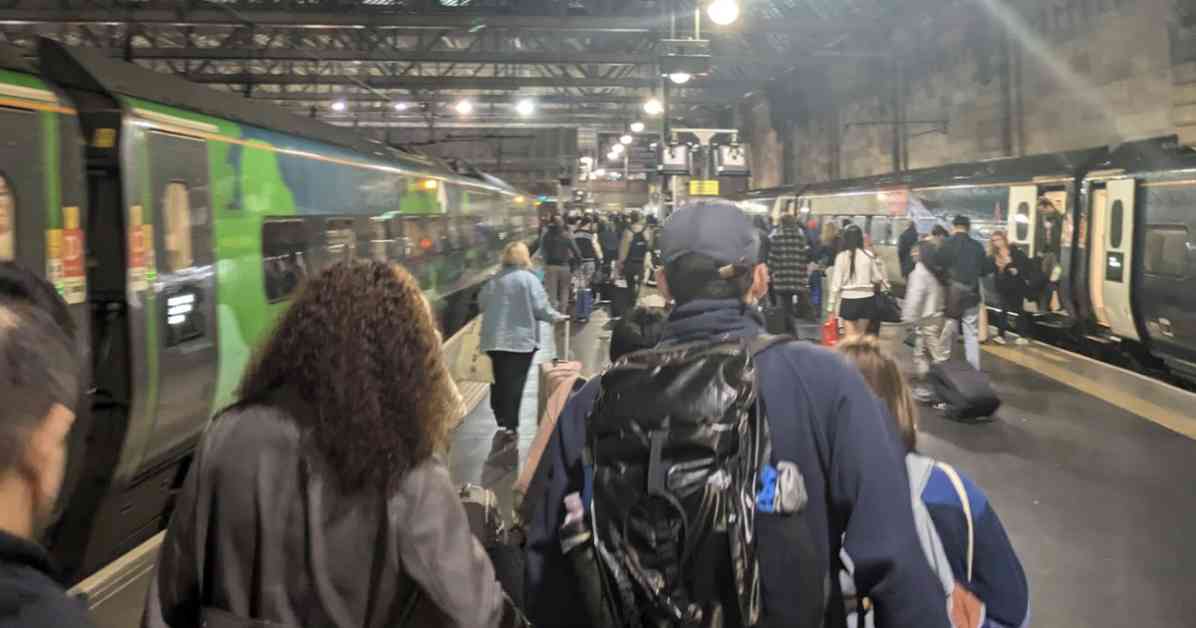Hundreds of Edinburgh locals found themselves trapped on a train overnight in what can only be described as a 12-hour ordeal. Avanti West Coast issued an apology for the incident that left passengers stranded due to a fault on the tracks.
One such passenger, Lucy Miller, 26, from Broughton, had embarked on her journey back to the capital from Euston when her train came to a halt at Preston. The carriages remained stationary due to a ‘failed train’ on the west coast line, leaving Lucy and many others stranded in the Lancashire town for hours.
Lucy described the lack of communication and support from staff as ‘disgraceful’. She recounted the experience of being stuck in Preston for about four hours, with no offer of water or food. The passengers were left in the dark about what was happening, causing frustration and tension among those on board.
It wasn’t until Lucy took matters into her own hands and searched online that she discovered there had been a train fault at Motherwell, leading to a backlog on the west coast line. She mentioned that fights were breaking out on other trains, highlighting the chaos and confusion that ensued.
The lack of support for disabled passengers was particularly concerning to Lucy, who witnessed firsthand the struggles they faced without proper assistance. She emphasized the need for better communication and organization during such situations to avoid leaving passengers feeling helpless and abandoned.
After four hours of being stranded, the passengers were finally moved to another train, only to be informed at 2 am that they were being taken to Glasgow Central instead of their intended destination of Edinburgh. The disoriented travelers arrived in Glasgow at around 5 am, where chaos ensued as hundreds of people scrambled to find transportation home.
Lucy expressed feeling like she had ‘jet lag’ after the 12-hour ordeal, knowing that she would now be significantly delayed in reaching her workplace in Edinburgh. The disruption had taken a toll on her and many others who had been caught up in the unexpected turn of events.
An Avanti West Coast spokesperson issued a statement acknowledging the fault on the train and the subsequent impact on passengers. They assured affected customers that they could claim compensation for the inconvenience caused and apologized for the experience they had endured.
The spokesperson explained that passengers were evacuated onto a replacement train after the initial train lost power at Abington, leading to the blockage of the line towards Glasgow Central. They emphasized the importance of implementing contingency plans and supporting passengers during such disruptions to ensure their safety and well-being.
In response to the incident, Avanti West Coast committed to conducting a review to understand how to minimize delays in the future and improve their response to similar situations. They encouraged passengers to claim the compensation they were entitled to for the disruption they had experienced.
The incident served as a reminder of the challenges faced by both passengers and transport providers when unforeseen circumstances disrupt travel plans. It highlighted the importance of effective communication, support, and contingency planning to mitigate the impact on passengers and ensure their safety and well-being.
As travelers continue to navigate the uncertainties of public transportation, incidents like the one experienced by Lucy and hundreds of others serve as a wake-up call for the industry to prioritize passenger care and communication in times of crisis.
Lessons Learned: Improving Passenger Experience
The incident involving the stranded passengers on the Avanti West Coast train underscored the need for better communication and support for travelers during disruptions. By learning from this experience, transport providers can implement measures to enhance the passenger experience and minimize the impact of unforeseen events.
Effective Communication: One of the key takeaways from this incident is the importance of clear and timely communication with passengers. Providing updates, explanations, and instructions can help alleviate confusion and anxiety among travelers facing unexpected delays or disruptions.
Support for Vulnerable Passengers: The incident highlighted the challenges faced by disabled passengers and others with specific needs during a crisis. Transport providers must ensure that adequate support is available for all passengers, regardless of their circumstances, to ensure their safety and well-being.
Contingency Planning: Having robust contingency plans in place can help transport providers respond effectively to unexpected events and minimize the impact on passengers. By anticipating potential disruptions and preparing appropriate responses, companies can ensure a smoother and more coordinated approach to crisis management.
Looking Ahead: Building Resilience in Public Transportation
As the public transportation sector continues to evolve, it is essential for companies to prioritize passenger safety, comfort, and satisfaction. By learning from incidents like the one involving the stranded Edinburgh locals, transport providers can strengthen their operations and build resilience in the face of challenges.
Investing in Technology: Embracing technology can enhance the passenger experience by providing real-time updates, digital communication channels, and personalized services. By leveraging digital tools and platforms, transport providers can improve communication, streamline operations, and deliver a more seamless travel experience.
Training and Empathy: Equipping staff with the necessary training and skills to handle crisis situations with empathy and professionalism is crucial. By fostering a culture of understanding and support, transport providers can ensure that passengers feel valued, heard, and cared for during challenging times.
Collaboration and Transparency: Building trust with passengers requires transparency, accountability, and collaboration. By engaging with customers, listening to their feedback, and implementing changes based on their input, transport providers can foster a culture of openness and mutual respect.
Conclusion
The incident involving the stranded Edinburgh locals on the Avanti West Coast train served as a stark reminder of the challenges faced by passengers when disruptions occur. By focusing on effective communication, support for vulnerable passengers, and robust contingency planning, transport providers can enhance the passenger experience and build resilience in the public transportation sector.
As travelers continue to rely on public transportation for their daily commutes and journeys, it is essential for companies to prioritize passenger care, safety, and satisfaction. By learning from past experiences and implementing measures to improve their services, transport providers can ensure a smoother and more seamless travel experience for all passengers.













